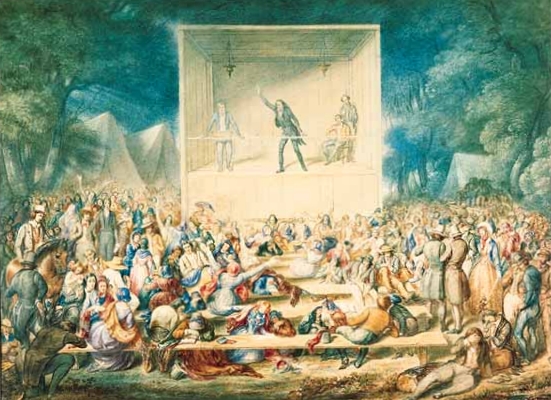今日、どれほど「サクラメント」(カトリックは7つの秘跡。洗礼、堅信、聖体、ゆるし、病者の塗油、叙階、結婚。プロテスタントは洗礼と聖餐だけ)が廃(すた)れてしまったかは、福音派が長いことそのルーツを忘れてしまっていることを如実に表している。第二次大覚醒は聖餐の修養会で始まったことを、私たちは今一度確認すべきだ。1801年、あちこちの教会がケンタッキー州ケーンリッジに集まり、自らを整えて聖餐にあずかった。このリバイバルについては以前の記事にこう書いた。
[toggle]There is no greater signal that evangelicals have long forgotten their roots than the disrepair into which the sacraments have fallen in our day. By way of reminder, we should note that the Second Great Awakening began as a Communion retreat. Churches from all over gathered at Cane Ridge, Kentucky, in August 1801 to prepare themselves for and then partake in Communion. As I wrote in an article on this revival: [/toggle]
プロテスタントでは各自にぶどうジュースとパンが配られて一斉に口に含む(写真:Alanscottwalker)
聖餐(毎年3~5日間、日中に行われる集会において、聖餐でクライマックスを迎える)は、何十、いや何百もの人を集めた。このケーンリッジの聖餐では、時に2万人もの人が集まり、見たり、祈ったり、説教したり、涙したり、うめいたり、地面に倒れこんだりしていた。そのそばであざ笑う者もいたが、多くの人が神の不思議な御手に驚愕して帰っていった。
[toggle]Communions (annual three-to-five-day meetings climaxed with the Lord’s Supper) gathered people in the dozens, maybe the hundreds. At this Cane Ridge Communion, though, sometimes 20,000 people swirled about the grounds—watching, praying, preaching, weeping, groaning, falling. Though some stood at the edges and mocked, most left marveling at the wondrous hand of God. [/toggle]ケーンリッジの聖餐は、米国の歴史上、最も報道されたイベントの一つになった。ヴァンダービル大学のポール・コンキンによれば、「間違いなく米国史上最も大切な宗教的集会」だ。これをきっかけに福音派が広がり、すべての米国人の生活へ届いた。長きにわたり、キャンプ集会やリバイバル集会での祈りは「主よ、ケーンリッジのようにしてください」だった。
[toggle]The Cane Ridge Communion quickly became one of the best-reported events in American history, and according to Vanderbilt historian Paul Conkin, “arguably … the most important religious gathering in all of American history.” It ignited the explosion of evangelical religion, which soon reached into nearly every corner of American life. For decades the prayer of camp meetings and revivals across the land was “Lord, make it like Cane Ridge.” [/toggle]そのような聖餐式では、人々は金曜日に集まり、その日の晩と土曜日は祈り、聖書朗読し、説教を聞いて、日曜日の礼拝と聖餐式のために自身を整えた。ケーンリッジの土曜は、あまり静かなものではなかった。
[toggle]As such Communions, people gathered on Friday and spent that evening and Saturday praying, reading Scripture, and listening to sermons as they prepared themselves for worship and Communion on Sunday. At Cane Ridge, Saturday was not so quiet: [/toggle]土曜の朝の集会は静かだった。まるで嵐の前の静けさのように。しかし午後になると、集会場でもテントでも説教が続けられ、興奮が頂点に達し、煙と汗の中で、キャンプは音を立てて噴火した。悔い改めの声、赤ちゃんの泣き声、子どもたちの騒ぎ声、そして馬のいななき。
[toggle]The Saturday morning services had been quiet—the proverbial lull before a storm. But by afternoon, the preaching was continual, from both the meetinghouse and the tent. … Excitement mounted, and amid smoke and sweat, the camp erupted in noise: the cries and shouts of the penitent, the crying of babies, the shrieking of children, and the neighing of horses. [/toggle]そして、激しく体を動かす「運動」が始まった。叫び声や泣き声とともに、ある者は意識を失い、ある者は膝(ひざ)の力が抜け、ある者はふらついた(ケンタッキー州知事のジェイムス・ゲラードもその一人)。倒れても、意識があったり話ができたりする者もいた。意識不明になり、発作やヒステリーの兆候を見せる者もいた。倒れた人は少なかったが、草原の一部は戦場のようになっていた。
[toggle]Then the tumultuous bodily “exercises” began. Along with the shouting and crying, some began falling. Some experienced only weakened knees or a light head (including Governor James Garrard). Others fell but remained conscious or talkative; a few fell into a deep coma, displaying the symptoms of a grand mal seizure or a type of hysteria. Though only a minority fell, some parts of the grounds were strewn like a battlefield. [/toggle]ある者は倒れたところにずっといた。またある者は、もっと広いところに運び出され、人が周りに集まって祈り、賛美歌が歌えるようにした。「もし彼ら(倒れた人たち)が話をしたら、何を言うかに注目が集まったし、それはとても厳粛で影響のあることだった。そのような励ましに多くの人が心を打たれた」という報告が残っている。
[toggle]Some were attended to where they fell; others were carried to a convenient place, where people would gather around them to pray and sing hymns. “If they [the fallen] speak,” one reported, “what they say is attended to, being very solemn and affecting—many are struck under such exhortations.” [/toggle]
1839年、第二次大覚醒時のキャンプ集会の様子を描いた水彩画
日曜日の早朝は、対照的に穏やかさが戻った。徹夜をしていた者も中にはいたようだが。この集会の中心、その目的、つまり聖餐が予定どおり集会場で行われた。近隣の教会の牧師が集会場の外で伝統的な説教をして、聖餐にあずかる者は「サクラメント」のために中に入っていった。中央に十字架のように配置された台で、一度に100人は聖餐を受けることができた。それは何時間と続き、何百人もの人が聖餐を受けた。ジョン・ライルは聖餐にあずかる中で、「今まで以上に、神へのはっきりとした見解を持った」とし、話す時に「めずらしいほどの優しさ」を感じたという。
[toggle]Early Sunday morning, relative calm reigned, though some had been up most of the night. The central purpose of the gathering—the Communion—took place as scheduled in the meetinghouse. The minister of a nearby congregation preached the traditional sermon outside, and then those with Communion tokens went inside for the sacrament. The tables, set up in the shape of a cross in the aisles, could probably accommodate 100 at a time. Over the ensuing hours, hundreds were served. Lyle wrote that he had “clearer views of divine things than … before” as he partook, and that he felt “uncommonly tender” as he spoke. [/toggle]この歴史を復習する目的は、「このように感情的に豊かな聖餐をすべきだ」と言いたいからではない。明らかに、これは米国の教会史上でも特殊な時期だ。私が印象深いと思うのは、信仰者が聖餐を畏敬の念と真面目なアプローチでとらえていることなのだ。
[toggle]The point of rehearsing this history is not to suggest that we should try to create emotionally extravagant Communion services like this. Clearly, that was a unique moment in American church history. What impresses me is the reverence and seriousness with which these believers approached Communion. [/toggle]サクラメントにつまずく
[toggle]Stumbling Over the Sacraments[/toggle]ここで私の言うところの「サクラメント」を明確にしよう。ある福音派の教会では、「聖餐や洗礼の儀式とは、イエスが私たちにそうするようにと命じられたことであり、またキリストへの従順と信仰を表すもの」と説明する。ただ、「サクラメント」にはその二つの意味のほかに、もう一つ重要なこと──「恵みの手段」が含まれている。

カリフォルニアの教会での浸礼(写真:David Ball)
私は、何か特別な神学について提案しようとしているのではない。(パンとぶどう酒がキリストの肉と血になるという)実体変化か(キリストの血肉が現実にパンの実体とともに現存するという)共在説か、実在か象徴(単に象徴的に現存する)かといったことではない。聖餐と洗礼は、その人の信仰が深まり、強められる経験であり、そういうことは神の恵みによる以外には起こりえないのだ。これがこの記事で私が言うところの「恵みの手段」であり、「サクラメント」という言葉を使って語るゆえんだ。
[toggle]Let clarify my use of the term sacrament. Some evangelical churches call the Lord’s Supper and baptism ordinances, to suggest they are actions Jesus commands us to participate in, and that they signal our faith in and obedience to Christ. The term sacrament includes these two ideas and another crucial one: that they are means of grace. By “means of grace” I’m not proposing any specific theology—whether trans- or consubstantiation, whether real or symbolic presence. But for all believers, Communion and baptism are practices in which one’s faith is deepened and strengthened, and that sort of thing only happens by God’s grace. This is what I mean by “means of grace” in this article, and why I will use the word sacrament to talk about them. [/toggle]先に言ったとおり、「サクラメント」は福音派の教会でひどく低い状態にある。
[toggle]As I said, I believe these sacraments are in a profoundly low state in many areas of evangelical church life. [/toggle]洗礼はどうか。「あなたがたは行って、すべての民をわたしの弟子にしなさい。彼らに父と子と聖霊の名によって洗礼を授け」(マタイ28:19)という大宣教命令を大々的に叫ぶような教会であっても、「サクラメント」は伝道の中心にはなっていない。この問題を指し示すような調査結果を見つけることは難しいが、これがどれだけ深刻かを示すことをお話ししよう。
私はイリノイ州ホイートンにある聖公会の教会に通っている。ホイートン大学の近くにある教会だ。カリスマ的に魅力のある賛美と、聖書を中心にした説教が、多くのホイートン大学の学生を魅了し、ここに通って会員になっている。しかし、聖餐式にあずかるためには、そしてこの教会の会員になるためには、洗礼を受けていなくてはならない。ホイートン大学の学生の中でも、熱心で、敬虔で、賢い、福音派教会で育った若者の多くがまだ洗礼を受けていないことに牧師たちは驚いている。大学生活のために実家を離れるもっと前に、このことについて地元の教会で話をしておくべきなのではないかと思わずにはいられないのだ。(後編に続く)
[toggle]Take baptism. Even among churches that believe Matthew 28:19 is the church’s rallying cry—“Go make disciples of all nations, baptizing them ….”—the sacrament is no longer central to their mission. It would be difficult to come by statistics that suggest the problem, but one anecdote suggests it’s a serious one. I belong to an Anglican church in Wheaton, Illinois, which meets not far from Wheaton College. The charismatic singing and Bible-centered preaching attract many Wheaton College students to attend worship and to become members. However, to partake in Communion, as well as to become a member, one must have been baptized. The pastors are continually surprised at the number of Wheaton College students—no doubt some of the most earnest, devout, and intelligent young believers in the evangelical world—who have yet to be baptized. One would have thought that their churches would have attended to this matter long before they left home for college. [/toggle]